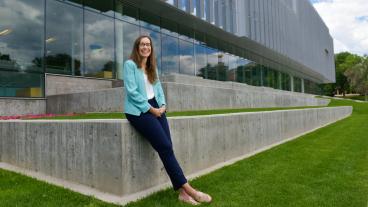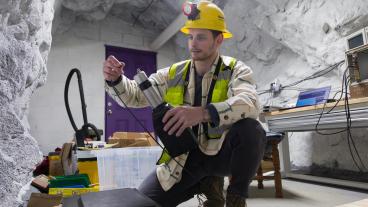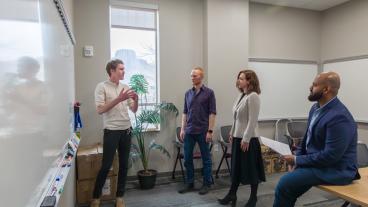Civil and Environmental Engineering graduate student Skylar Zilliox received an Engineering Physics degree from Mines in the spring, but this was not her first degree. She also received a bachelor associate degree in Liberal Arts from St. John’s College in Santa Fe in 2009. Being a non-traditional student, we asked Skylar to tell her about her experiences here on campus and give advice to future students like her.
What was your experience like before you came to Mines?
Since it's kind of an unusual program, I'll give you my 30-second cocktail party spiel on it. It's a Great Books program, which means that we read the original texts in philosophy, literature, math, and science that have been most formative for western civilization. We start with the ancient Greeks (Plato, Aristotle, Homer), and move forward in time from there, up to about mid-20th century; every class is discussion-based, with a strong emphasis on building critical thinking and conversational skills. I loved everything there, but I was probably most passionate about history and philosophy of science.
Why did you choose Mines?
I graduated from St. John's thinking I wanted to become a high school teacher, but three semesters working as an in-class tutor for a college prep program in Denver Public Schools convinced me to seek out a different career path. As important as teaching is, I found myself wanting more concrete results from my work. My parents are both engineers, and my mother actually graduated from Mines in 1980, so going into engineering was a fairly natural transition. I grew up in Denver, and I knew I wanted to stay close to my family, so Mines was far and away my first choice, particularly given the high academic standards here.
Afterwards you became a teaching assistant. What did you gain from that experience?
I was a TA for Physics II, which focuses on electricity and magnetism. I would say the main thing I learned was how to quickly adjust my explanations for different learning styles. I am a very visual person, so to me, the concepts in that class were easiest to grasp by visualizing what the electromagnetic fields were doing. However, many students respond much better to equations, or to analogies to physical objects. Learning to switch up my teaching style was probably one of the most important skills I took from being a TA. That, and compassion: if you assume that everyone in there is having a hard time (because it's a physics class, so who isn't?) and treat them gently and with lots of encouragement, students learn better. Being intimidated by a subject is a serious hurdle to actually learning it.
How did you get involved with the Nanoethics and Policy Education Effectiveness project and what resulted?
Physics professor Chuck Stone was actually a major factor here. I applied to REMRSEC, but told Chuck I was particularly interested in the ethics of energy development; he told me to go knock on Liberal Arts and International Studies professor Carl Mitcham's door, since Dr. Mitcham does a lot of work on ethics and technology. Dr. Mitcham, after a few meetings, arranged for me to work under fellow liberal arts and international studies professor Jessica Rolston's guidance last summer. I analyzed data from courses in Human Systems and Nature and Human Values that looked at how student's views on nanotechnology and related ethical issues changed as a result of those courses; this work continued this past school year as part of an Undergraduate Student Fellowship, culminating in one paper, submitted to NanoEthics, which is currently under review; we will hopefully get another paper, examining impacts across multiple semesters, written and submitted by the end of the year.
As a graduate student at Mines, what will you be working on with Jessica Rolston in the fall?
I will be in the Civil and Environmental Engineering graduate program, as part of a fellowship through the new ConocoPhilips Center for a Sustainable WE2ST (WE2ST stands for Water, Energy, Education, Science, and Technology). My research will be focusing on social aspects of the joint sustainability of water and unconventional energy sources. Jessica Rolston and civil and environmental engineering professor Terri Hogue will both be advising me—Terri will provide support for engineering aspects of the work, and Jessica, with her background in energy anthropology, will be guiding the "human" side of the investigation.
What advice would you give a non-traditional student at Mines?
It's not a race! I think it's easy to feel out of place, unaccomplished, or just "behind" when you're surrounded by people several years younger than you. Forming study groups with other non-traditionals is an excellent way to make friends with people in the same boat.
What do you intend to do after Mines?
You'd think, at my age, I'd have that figured out. Part of me wants to follow up on my passion for education, and end up teaching at the college level; however, I'm also quite interested in environmental remediation, and there are several companies that do very interesting work in that area. If past performance is any indication, I'll probably end up doing a mix of things.
Contact:
Kathleen Morton, Communications Coordinator / 303-273-3088 / kmorton@mines.edu
Karen Gilbert, Director of Public Relations / 303-273-3541 / kgilbert@mines.edu



